 Revolutionary Leader before capture
Revolutionary Leader before capture Something happens to the leader. She is attacked, she is maligned. She shows some signs of fatigue, some signs of weakness. She falls into enemy hands, but they are careful not to make a martyr of her.
 Revolutionary Leader as incendiary author
Revolutionary Leader as incendiary author Underneath the prisoner’s drug-benumbed, listlessly synapsing brain, the spirit of the rebel lives on. There is something she needs to tell someone, but what is it? And to whom should she tell it? She can’t… quite… make the connections. It has something to do with what she is living, what she is experiencing. Must… make… observations… Must… tell... someone…

Two things stand out in the prisoner’s missives: the agents and the subsequent affect. Ativan, Haldol, Valium, Tegritol, Depacote, Trilifon, electro-convulsive shock… And then she describes the damage:

“Every time she went in [to the mental hospital]… she felt submerged, as if someone was holding her under water for months. When she came out she was... helpless, unable to make the smallest decision, speechless, and thoroughly programmed by a rigid hospital routine, so that even her stomach grumbled on time… “
“Her indecision was awful, for no sooner did an impulse arise to do something, than it would be crossed by a contrary impulse; she was conflicted. (She watched herself undergo this in slow motion as it were, but was powerless to avoid it.) Or she was confronted by so many choices of things to do, that must be done, that she could choose none of them.”
“She could not read. She could not write… the words bounced off her forehead like it was steel; she simply could not care about the content of any written material, be it heavy or lightweight. Why? Why read it? Why absorb?”
“Once in a while she prodded herself to write, but the old excitement of creation did not return, or if it did, it fizzled by morning after her nightly medication.”

Can’t they see that this little book is in code, that it has been smuggled out from behind enemy lines at great risk? Can’t they see that she is writing about the fact she can’t write? Can’t they see that she is naming the inability to name? Can’t they see that this is the most dangerous and difficult revolutionary tract she ever wrote? Don’t they understand that she is no longer pointing out the horror, the endgame that awaits us in patriarchy, but that she has become the living manifestation of it?
The book is titled Airless Spaces. It was published, after many rejections, by Semiotext(e) in 1998. The author is Shulamith Firestone, who, at the age of twenty-five, wrote The Dialectic of Sex: The Case for a Feminist Revolution, the book that changed my life forever.
In Orwell’s dystopian novel 1984, he depicts the endpoint of breaking the spirit to be the moment when the hero is threatened with rats eating off his face and he shouts out, “Do it to Julia!”—signaling his betrayal of his beloved, as well as his loss of humanity. But this is not the endpoint. Orwell’s anti-hero still loves his own life. The true endpoint is described by Firestone: “... hearing of a death, she often wished she could trade places with that person.”
The author of this fierce, unbearable book died on August 28, 2012. Her body was not discovered until almost a week later. According to the media, Shulamith Firestone died of natural causes.
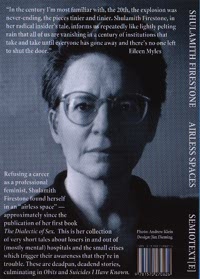
"I dreamed I was on a sinking ship. It was a luxury liner like the Titanic. The water was slowly seeping up from below, and the people aboard the ship knew that they were doomed. On the two top decks it was gaiety and mirth, with people dressed to the nines, eat drink and be merry for soon we shall all die. But a note of hysteria hovered in the merrymaking and here and there I saw strange goings on, like in a Grosz cartoon.
I fled down some metal stairs to where people were starting to get their pantslegs wet. Wasn't I looking in the wrong direction? But I desperately searched the equipment in the basement for something that would supply an air pocket, and I succeeded in finding a refrigerator into which I stowed myself, hoping to live on even after the boat was fully submerged until it should be found.
I woke from this dream in a panic that the disaster was real, and that I was picking all this up by e.s.p. I even called UPI to ask if there was any recent news of a sinking liner, and they said yes, but it was in the Bermuda Triangle, so no attempt would be made to find the ship."
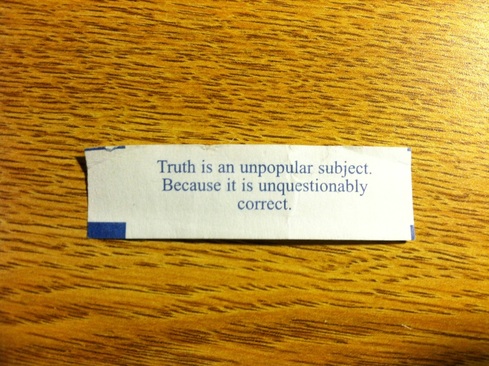
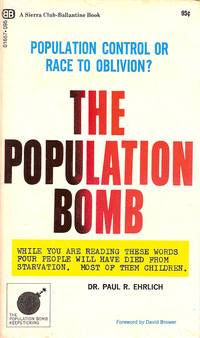
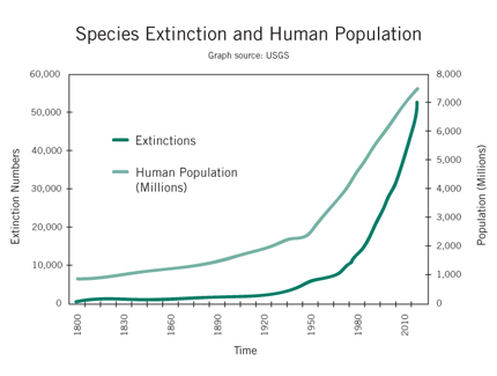
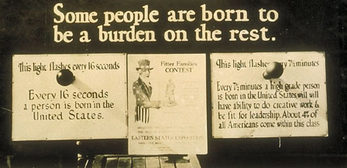


 RSS Feed
RSS Feed
